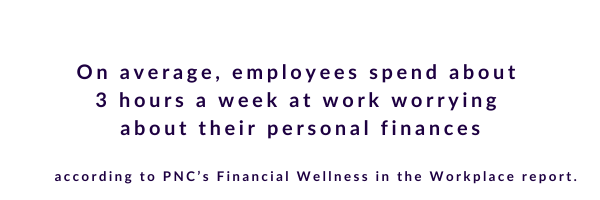For Immediate Release:
Dateline: Chicago,
IL
Wednesday, December 4, 2024
About 7 in 10 US employees say they’re stressed about money, per PNC’s 2024 Financial Wellness in the Workplace report. However, not all employees face the same financial woes. Younger generations tend to worry about affording monthly expenses, whereas Baby Boomers tend to worry about if — and when — they can afford to retire. Engaging a multi-generational workforce can be difficult. However, by understanding each generation’s most common financial concerns, HR and business leaders can make the most of their benefits budgets while supporting employees’ financial well-being.  Financial worries can lead to lower productivity and increased turnoverFinancial stress doesn’t only impact an employee and their household. Employees’ financial stress and its impacts can seep into the workplace if left unaddressed. On average, employees spend about 3 hours a week at work worrying about their personal finances, according to PNC. Over time, this distraction can lead to a loss of productivity that potentially hurts a company’s bottom line. Moreover, employees stressed about money are twice as likely to look for a new job, according to PwC, leading to increased attrition and a loss of top talent. By learning the common financial challenges for each generation, employers can adopt impact-driven benefits designed to help alleviate all employees’ financial stress. Generation Z & Millennials often worry about paying off their student loan debtGeneration Z, born from 1996 to 2012, is the youngest generation in today’s workforce. Gen Z employees are typically recently out of college, university or vocational training and early into their careers.
Millennials, born 1981 to 1996, alongside Gen Z face the looming burden of paying off student debt. In recent decades, the cost of education has skyrocketed — the average undergraduate tuition has nearly tripled from 1980 to today, according to the National Center for Education Statistics (NCES). As a result, Gen Z and Millennials tend to have more student debt compared to their parents and grandparents’ generations. Solution: Invest in student debt financing and repayment assistance offeringsAlthough credit card debt is the most common form of debt, studies show that student loan debt is the most challenging debt to pay off, largely due to inflation, high tuition rates and compounded interest. Over time, student debt can impact an employee’s ability to reach their financial goals, such as securing a mortgage or auto loan. Over 1 in 3 US employees wish their employer offered student loan financing and repayment assistance benefits, according to PNC’s report. Moreover, employee benefits related to student debt aren’t just for younger generations. Tuition assistance benefits can potentially help older generations, especially those who may still carry student debt from graduate school programs or help finance their children’s education. Generation X struggles with today’s expenses while still saving for tomorrowIn between Baby Boomers and Millennials lies Generation X. Born between 1965 and 1980, Gen X is next up for retirement, following Baby Boomers. A common financial concern for Gen X is being able to save for retirement while balancing today’s expenses. Due to limited disposable income, sometimes employees forgo contributing to their retirement account to afford key monthly expenses, such as rent, groceries, car insurance, etc. Some employees have resorted to borrowing from their 401(k) to help make ends meet. Today, approximately 40% of Gen X employees have $0 saved for retirement, according to the National Institute on Retirement Security. Luckily, even the oldest members of Gen X still have the runway to prepare for retirement. Solution: Contribute to employees’ 401(k)s through match contributionsTo help employees stressed about money afford today’s expenses, many companies have invested in a match contribution program. Company match programs are designed to incentivize employees to save for retirement — for each dollar an employee puts in their 401(k), employers will “match” or contribute the same amount. Today over 50% of employers offer company match programs, compared to 46% in 2023. Match programs can help employees exponentially grow their retirement savings. This can be especially valuable for employees trying to catch up on their retirement savings. Baby Boomers’s top concern is making sure they’re ready for retirementRetirement readiness is the leading financial concern for employees born between 1946 to 1964, also known as Baby Boomers. Although some Baby Boomers have already retired, others are still in the workforce getting ready to enter retirement. A common worry for Baby Boomers is if — and when — will they be able to retire. Entering retirement is a big step in a person’s life. That said, pre-retirees, including Baby Boomers, must understand how much money they need to live comfortably in retirement. This can help alleviate financial concerns, such as not having enough money to retire or potentially outliving one’s savings. Solution: Offer 1:1 financial advising to help retirement readinessMany employees, including pre-retirees, aren’t sure how prepared they are for retirement. Thankfully, with the support of knowledgeable financial advisors, employees can assess their retirement readiness and receive tactical steps on how to improve. By offering 1:1 financial advising, employees can receive the personalized support they need to help address and alleviate their top financial stressors. Need a financial wellness solution with customized solutions for every generation? Try Best Money Moves! Best Money Moves is an AI-driven, mobile-first financial wellness solution designed to help employees with varying levels of financial knowledge dial down their most top-of-mind financial stresses. As an easy-to-use financial well-being solution, Best Money Moves offers comprehensive support toward any money-related goal, ranging from debt management to purchasing a home. With 1:1 money coaching, budgeting tools and other resources, our AI-driven platform is designed to help bolster employee financial wellbeing. To learn more about Best Money Moves Financial Wellness Platform, let’s schedule a call. Contact us and we’ll reach out to you soon.
Ilyce R. Glink, Founder+CEO
O: 847-242-0550x100
C: 312-933-3450

Best Money Moves:
|